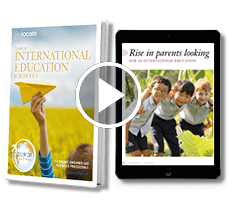Growing up among worlds, how schools support TCK’s
The term ‘Third Culture Kid’ (TCK) is being increasingly used in International Education. How can schools help students establish a sense of belonging, at home, school and in the wider community?
Managing a different culture
For families experiencing short term transition, many factors come into play: cultural and linguistic change can be challenging, the age of the child makes a difference; younger children tend to be more flexible, while teenagers can have emotional reactions and need more support finding friendship groups within school and beyond. Students who have habitually moved a lot may appear to adapt quickly, but don’t be fooled. The external chameleon can hide a confused identity, attempting to mould themselves into acceptability so as not to stand out, while mourning the loss of a friendship group or familiar hobby. The other extreme can be attempting to maintain a social, academic or sporting identity in an environment with different competitive standards or established role holders. These, and any other reactions, merit our understanding.For all of these groups a major challenge can be ‘returning’ to the ‘country of origin’ whether to re-settle or for further study. Culture shock in these situations can be extreme with the expectation to know and follow cultural norms which are alien to you, and a lack of peer group with similar experience. You may look and sound like you belong, but you have no sense of belonging. For myself, I only feel at home in a multicultural environment. Like many TCKs, I identify more with people than with place. And yes, my school experiences had a lot to do with that!
Students who have habitually moved a lot may appear to adapt quickly, but don’t be fooled. The external chameleon can hide a confused identity, attempting to mould themselves into acceptability so as not to stand out, while mourning the loss of a friendship group or familiar hobby. The other extreme can be attempting to maintain a social, academic or sporting identity in an environment with different competitive standards or established role holders. These, and any other reactions, merit our understanding.For all of these groups a major challenge can be ‘returning’ to the ‘country of origin’ whether to re-settle or for further study. Culture shock in these situations can be extreme with the expectation to know and follow cultural norms which are alien to you, and a lack of peer group with similar experience. You may look and sound like you belong, but you have no sense of belonging. For myself, I only feel at home in a multicultural environment. Like many TCKs, I identify more with people than with place. And yes, my school experiences had a lot to do with that!Read more about Third Culture Kids:
- Third Culture Kids: You know where you're from
- The ups and downs of being a third culture kid
- Living abroad with teenagers: opportunities and challenges
School should be a 'safe space'
A quality international school can provide support in all of these situations. Security and relationships are the two most important aspects for us consider. Schools need to be safe spaces filled with open hearted, responsive, listening educators. The school is the community which offers stability and a sense of belonging. Everyone needs a friend, so partnering children with different peers and encouraging them to join extracurriculars will help them find their niche. An effective school helps families in transition by providing community links and reminders to keep familiar routines going, even in a temporary space. Studies indicate that most schools are strong with supporting entry transitions, but more attention needs to be given to leaving transitions, preparing students and families in advance, particularly if this involves moving out of the international community.Children pick up on their parent’s emotions. If the parents are calm and positive, the children are more likely to be too. Parents may need reminders and support from the school to involve their children in honest conversation about their contexts, to provide information and answer questions, or indeed, to take care of their own needs, particularly when dealing with change. The saying goes ‘it takes a village to raise a child,’ in our case: it takes a school community to support a family’s needs.There are many benefits to growing up ‘among worlds’. Flexibility, resilience, global perspective, intercultural understanding and linguistic skill are all positive attributes which can contribute to a successful life. And moving past all other concerns, you develop an inner sense of stability, an ability to take care of yourself. Personally I would not have had it any other way.Kirsten Durward is the PYP Co-ordinator at KIS International School in Bangkok. She attended 12 schools in 9 countries and remains at heart a Global Nomad.Further reading and resources:
‘Third Culture Kids, the Experience of Growing Up Among Worlds’ by David C. Pollock and Ruth E. Van Reken‘Raising Global Nomads: Parenting Abroad in an On-Demand World’ by Robin Pascoe,https://www.schoolchoiceintl.comhttps://expatchild.comhttp://www.tckworld.comhttps://www.interactionintl.orgThis article is from Relocate Global's Guide to International Education & Schools 2019/20 which is packed with expert tips and information for those relocating and the professionals supporting them. For volume options, co-branded editions, digital or online licence agreements and advertising opportunities, contact Fiona Murchie at +44 (0)1892 891334 or email fiona@relocatemagazine.comNow available as an ebook on Amazon! Simply download from Amazon onto your Kindle, mobile phone or tablet to read wherever you are!
Subscribe to Relocate Extra, our monthly newsletter, to get all the latest international assignments and global mobility news.Relocate’s new Global Mobility Toolkit provides free information, practical advice and support for HR, global mobility managers and global teams operating overseas.
 Access hundreds of global services and suppliers in our Online Directory
Access hundreds of global services and suppliers in our Online Directory For more education and school-related news, visit our Education and Schools pages.© 2019. This article first appeared in the 2019/20 edition of the Guide to International Education & Schools published by Relocate Global, Spray Hill, Hastings Road, Lamberhurst, Kent TN3 8JB. All rights reserved. This publication (or any part thereof) may not be reproduced in any form without the prior written permission of Relocate Global. Relocate Global accepts no liability for the accuracy of the contents or any opinions expressed herein.
For more education and school-related news, visit our Education and Schools pages.© 2019. This article first appeared in the 2019/20 edition of the Guide to International Education & Schools published by Relocate Global, Spray Hill, Hastings Road, Lamberhurst, Kent TN3 8JB. All rights reserved. This publication (or any part thereof) may not be reproduced in any form without the prior written permission of Relocate Global. Relocate Global accepts no liability for the accuracy of the contents or any opinions expressed herein.©2025 Re:locate magazine, published by Profile Locations, Spray Hill, Hastings Road, Lamberhurst, Kent TN3 8JB. All rights reserved. This publication (or any part thereof) may not be reproduced in any form without the prior written permission of Profile Locations. Profile Locations accepts no liability for the accuracy of the contents or any opinions expressed herein.




































